Living, Loving, (and Going to the ER) in the Time of Coronavirus, Spring Continues in Seattle, Virtual or Faux AWP
- At March 08, 2020
- By Jeannine Gailey
- In Blog
 3
3
Spring Continues in Seattle, Despite Everything
The time change is here, and with it, spring is showing signs of moving in; early cherries and plums are blooming, quince, forsythia. Birds are returning, like a family of quail I spotted in the backyard, and red house finches. Emerald City Comic Con has been rescheduled. My husband has been in the house more than usual, as working from home is encouraged. We’ve been avoiding unnecessary human interactions we might have done without thinking; going to the bookstore or stopping to get flowers. Nature remains a great companion, even during an epidemic. Books, too.
- Early cherry branches
- Glenn with pink blossoms
- Me with plum trees
- A covey of quail
Living, Loving, and Going to the ER In the Time of Coronavirus
So, as nature continues to blaze ahead despite the troubles of humans, we cannot avoid the grim news. As of today, we’ve had 102 confirmed Coronavirus cases and 17 deaths in Washington State, and still our Coronavirus testing ability is pretty limited (despite promises from the government to the contrary.) Schools are closing. Every tech company has asked its employees to work from home. Social distancing and hand washing are encouraged. Stores shelves have been emptied of: bottled water, toilet paper, bleach, cold medicine, in some stores, canned goods, even Spam. Hand sanitizer and masks have been gone since two weeks ago. Glenn and I are spending a lot of time together – I mean, togetherness has a new meaning when you’re immune-compromised during an extremely contagious, fairly unknown outbreak.
This virus has changed the way we do some things; Glenn has had groceries dropped off at his car instead of going into the grocery store; I ordered books to be shipped instead of going into the bookstore. I text with my friends instead of seeing them in person.
Notes from an ER visit in the Epicenter: I had an unavoidable ER visit. I dreaded doing it, but so sick I could no longer stand on Friday night and with my PCP’s advice, we decided to go (and no, it’s not Coronavirus.) Glenn drove me fifteen minutes to the Redmond Swedish ER. (I live about a mile from Evergreen Kirkland, where most of the Coronavirus deaths have taken place; we avoided it.) I had him check in with the front desk to make sure they were okay for us (some hospitals are overwhelmed.) There was only one other patient at the hospital when I went, and everybody I encountered was friendly, gracious and wearing masks, paper clothing covers, and gloves in a flurry of safe practices. The ER doctor confided she was nervous that she hadn’t been informed about best practices or a treatment protocol for Coronavirus yet. She was super helpful; I left two liters of IV fluid heavier, with two prescriptions, a copy of all my labs, practical advice, and feeling much better. The day receptionist said they had had too many worried patients coming in with coughs who should have been meeting with PCPs or allergists (flu and allergy season are still happening, after all) and the night receptionist told me he’d been grocery shopping at night with a mask and gloves. Everyone was concerned that they didn’t have enough Coronavirus tests. But they had just gotten a shipment of masks with face screens. Not every medical worker is lucky enough to have them.
Disability, Germs, and Smart Hubs
Because we live in a high-tech city, I had a conversation with the doctor and nurse about how a smart home hub might help me both decrease germs in the house and make me feel more independent with my disability; I ordered the Echo Smart Hub the next day. They pointed out not touching light switches, tv remotes, door locks, etc as much as possible helps to not spread germs, and I can avoid injuries with MS by turning on lights with my voice or unlocking a door. I also got tips about killing germs on hard and soft surfaces. I’ve never used as much bleach as I have in the last two weeks in my life, and every tech device has been alcohol-wiped to an inch of its life. Technology, I have to admit, might make this particular pandemic outbreak a little less terrible, because now we can have food shipped to our houses, kids can do their classes online, we can even visit with our families via Facetime instead of in person to avoid getting them sick. Italy just quarantined 16 million people in an amazingly sweeping action. We haven’t had anything like that happen yet, but as new cases keep cropping up farther from here, the epicenter of the US outbreak (the other being: cruise ships) I hope we are capable to capping a serious problem across the US like they have had in China, Italy, and Iran. Bill Gates has promised money for a home coronavirus testing kit, which could help avoid spreading the germs to health-case workers. So I guess we’ll have to wait and see what the long-term effects will be. In China, non-touch screens are being introduced at fast food restaurants, orders and pickups made on phones with zero personal interaction.
Virtual or Faux AWP
Since a lot of us couldn’t go to AWP this year for various reasons, (I personally think it should have been rescheduled for the safety of immuno-supporessed people and, because, you know, you don’t want to increase germ spreading during a pandemic) we’ve been having a Virtual AWP Bookfair and a faux-AWP. I ordered books from local poetry-only bookstore Open Books, because small businesses all around Seattle are hurting (they ship for free with over $25 purchases) and because a lot of small presses were financially harmed because they had to withdraw from AWP. I also signed up for a couple of new literary magazine subscriptions, including EcoTheo and A Public Space. (A Poetry Magazine subscription was a recent gift.) I was trying to spend the money I would have spent at the bookfair had I gone. My book purchases, you might notice, are apocalyptic in theme.
I’ve also been working on pitches for essays and reviews during this extremely down downtime. And I’ve got a suite of coronavirus poems now in case anyone needs them.
I would also encourage you to please purchase a copy of Field Guide to the End of the World directly from Moon City Press, because they could not go to AWP at the last minute, and support them. Plus, I mean, I could not think of a more timely book to read right now. I mean, look at this cover! It’s all about survival in the face of all kinds of apocalypses.
So, if you also could not make it to San Antonio, I encourage you to reach out to your favorite small presses and writers, and support them. Send your favorite writers an encouraging note, subscribe to a new literary magazine. The best part of AWP is the community aspect, and at a time when in-person communications are riskier for some of us, virtual communications go a long way.
So, wishing you an as-happy-as-possible week. Wash your hands, avoid large gatherings, disinfect your cell phone, and spend some time reading poetry instead of the news – I guarantee you’ll feel better afterwards.
New Poems in Cherry Tree and Split Rock Review, Early Spring Flowers, Missing AWP and the Coronovirus
- At March 01, 2020
- By Jeannine Gailey
- In Blog
 0
0
Early Spring Flowers and New Poems in Cherry Tree and Split Rock Review
It seems in times of crisis I want to spend more time in nature. This last week we had early cherry and plum trees starting to flower, and I spent a lot of time taking pictures of them. Plum blossoms in particular have a strong, beautiful scent, especially in a grove of trees, which along with a little more sunlight, increases your feelings of well-being no matter what the headlines.
A big thank you to both Cherry Tree and Split Rock Review, which both featured new poems by me in their latest issues. That was a pick-me-up during a stressful week of doctor appointments (where I found out even if I had Coronavirus they did not have enough test kits on hand, so…good luck, I guess!) and a dramatic Coronavirus uptick in our region.
Here are my poems “The Wildness” and “Self-Portrait as Seismologist” as well as a picture of Sylvia posting with the new issue of Cherry Tree and tulips:
- Self-Portrait as Seismologist
- Sylvia with Cherry Tree issue
- The Wildness
More Spring Blossoming:
- Trying to find the perfect plum blossom shot
- My favorite shot of plum branches
- Close-up of plum blossoms
Split Rock Review published a more wintry poem, “Winter Solstice in Seattle:”
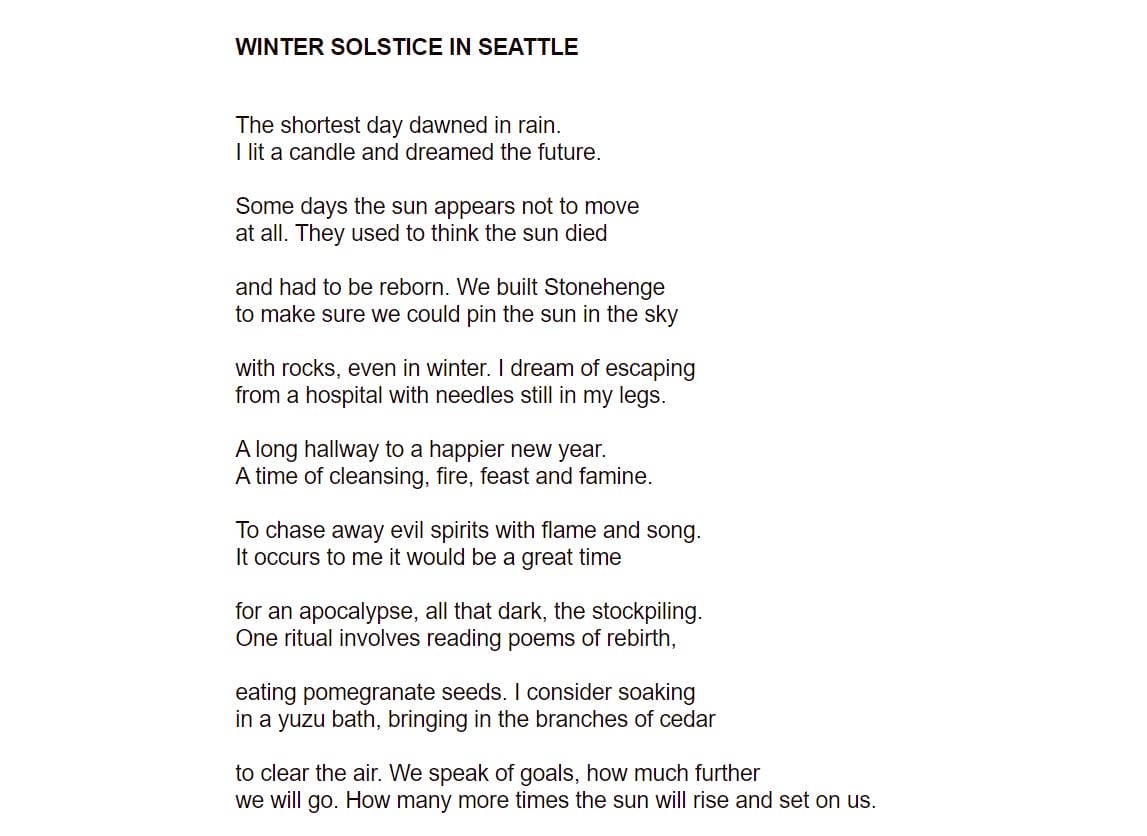
Missing AWP and Good Resources on the Coronavirus
Yes, I’ll be missing AWP this year. I’m supposed to get an emergency root canal tomorrow instead of flying into Texas. Much less glamorous. But AWP kind of has a pall over it this year, especially as it is happening just as more confirmed cases of COVID-19 are appearing all over the US. Hey, let’s all get together in one big room right as a highly communicable virus is hitting. Yikes! I have a genetic immune deficiency AND MS, so this is probably a more frightening prospect for me than most people. That estimated 2 percent death rate is higher for people with other health conditions, and much higher for the elderly – up to 15 percent.
We had the first US death from Coronavirus here yesterday, at a hospital about a mile from my house, and a small breakout (fifty people, both caregivers and patients) has happened in a long-term care home in Kirkland (and Kirkland and Redmond firefighters are in quarantine after reto an emergency there). There is a lot of uncertainty right now – the doctors and systems here don’t have enough test kits or the capacity to test everyone, we don’t have enough masks even for medical personnel due to poor government planning, and we’re showing more community-acquired illness (two high school kids at opposite ends of town just this week). In my local neighborhood stores, there’s been some panic-buying – shelves of masks, hand sanitizer, cleaning products, even in some places bottled water and toilet paper have all been cleaned out. My husband has been running most of the errands to keep me out of crowds, so I’m getting my reports second-hand. Going back to spending time outside, which can really help you not feel too house-bound when you’re mostly confined in your home, is really important. Hence my red-winged blackbird picture (photographed down the street from my house).
Here are some good resources that I found this week to help you all with Coronavirus. Remember I have a biology degree and I had a specific interest in virology, so I’m not just a poet – I’m a poet who knows too much about viruses! There’s a lot of panic, anxiety, and misinformation out there (this is not a hoax – and definitely do NOT drink bleach!). Our government is not adequately prepared – we don’t have enough testing kits (we have dramatically undertested over the last six weeks as the virus has spread, and we still won’t have enough tests for two more weeks) or masks for medical personnel, or respirators for those who go into respiratory distress. We can’t control a selfish, irresponsible government who doesn’t act in the best interest of its people (except by voting them out eventually) or a greed-filled, short-sighted pharma/medical complex (our supply chain is going to be impacted because we no longer make the drugs we need – nor their main ingredients – they’ve outsourced almost everything to China, and they didn’t order more masks/respirators when they were told to several years ago to prepare for a crisis because “it was too expensive”) but we can control our own actions – choosing to stay home when sick, washing hands more frequently, maybe staying away from crowds when possible – and we can choose to be kind to ourselves and our neighbors. Drink more fluids, get more sleep. Here’s more information:
From Australian virologists who have practical advice for “If you’re about to be in a pandemic”
A great article on a reasonable response to Coronavirus – and why being prepared – and preparing to help others – is key to containing a pandemic.
NPR’s tips on how to prevent and prepare for the novel Coronavirus
Don’t panic, and always carry a clean towel – Hitchhiker’s Guide to the Galaxy.
More updates to come. I am wishing you all a safe, happy, and healthy week. Spend some time outdoors with trees, and indoors with some poetry. Stay well.
Hanging Out with Poet Friends, Signs that Spring Is On The Way
- At February 23, 2020
- By Jeannine Gailey
- In Blog
 1
1
Signs that Spring is On the Way!
After a seemingly endless gloomy, wet winter, there are signs everywhere that spring is on the way. Despite the thunderstorm this morning, we’ve actually had some sunny days this last week, and then…surprise – a few blooming branches have been spotted here and there, and the display garden at my local gardening store is inspiring garden designs. (Planted a Daphne and a Viburnum today.)
It can’t help but lift the mood of my city, as a collective, despite gloom and doom in the news (Russians hacking the elections! The Coronavirus! Etc!) people are smiling more, chatting more, nodding to each other in the street. I’m definitely a spring girl – I was born in the spring, National Poetry Month is in the spring, plus flower flowers flowers! I’ll share a few images I snapped this week. Plus, I saw an eagle flying overhead every day this week. And our bobcat visited again! (Video link at end of post.)
- Mystery white blooming tree
- Sunset at Kirkland
- First Cherry blossoms
- Mystery berry tree
Spending Time with Poet Friends
Carved out some time (and energy – been a little under the weather) to attend a poetry potluck celebrating my friend Kelli Russell Agodon’s book contract with Copper Canyon Press, and it was great! I got to catch up with some friends I don’t see very often who I’ve known for fifteen, sixteen years now and meet others I’ve only “seen” on Facebook. Some of my old friends had little kids when I met the who are now in college or grown-up with jobs. We talked about where our lives had taken us. Some talked about not submitting or writing for a while. Some talked about new books and planning readings. It always helps give me perspective on the writing life and all of our journeys when I hang out with other writers. It also gave me motivation – I came home and submitted a piece of fiction (which I rarely do) and sent out some poems as well. There is just something about being with other writers that inspires me to action.
I even got to take a picture of some of the poet husbands I’ve known for just as long – and Glenn fit right in (except he was sad he didn’t have a hat! And I couldn’t get a picture where he had his eyes open)!
- Kels and I at an angle
- Group photo at the party
- Poet husbands – Kevin, Rose, and Glenn
- Holly Hughes and me
I was reminded that the writing life is a journey. There are ups and downs and detours, time to write and time to rest. We don’t all go at the same pace. Life gets in the way sometimes. A supportive spouse can make a lot of difference (and I feel lucky to have mine – plus everyone raved about his gluten-free mini pumpkin pear cupcakes)! And encouraging each other is part of the job. It can feel awfully lonely when those rejection slips roll in, or when your grant application is denied, or that job doesn’t come through. It’s good to have the company of people who have been there, done that.
And as promised, a link to the bobcat video on Instagram: https://www.instagram.com/p/B8ywucGBVQ4/
Valentine’s Day (and Day After) and a Discussion of Book Promotion and Maintaining the Writer’s Life with a Disability or Chronic Illness
- At February 16, 2020
- By Jeannine Gailey
- In Blog
 3
3
Valentine’s Day (and Day After)
This week didn’t start out great – I went in for a dental exam and cleaning and they found another tooth in need of an immediate root canal, I was put on more antibiotics, and at midnight on Valentine’s Day I got a text that said my dad was back in hospital with pneumonia. I spent a worried night and didn’t celebrate much on Valentine’s Day, especially since I had to spend an hour at the doctor’s office getting more tests. Sigh. My sweet husband did get me this wonderful bouquet, which actually had flowers that smelled good – even the roses, miraculous in February – which helped, even though I was mostly wiped out from an anxious night.
The day after Valentine’s Day was a little better – first, no doctor’s appointments, second, my dad was responding to treatment, and third it wasn’t pouring rain so we were able to get out of the house a little bit (although it’s been cold, in the forties, so still not like, awesome outdoor weather yet).
So Glenn and I went to Willows Lodge for drinks, dessert, and their live music, for a belated Valentine’s celebration. We came home and watched romantic movies and had chocolate-dipped strawberries and duck for dinner. This morning the morning actually had a little bit of light in it, as opposed to total gloom.
Also this week we got most of our taxes and (ahhhhh) I turned in my NEA grant application. Always a long shot, but I’m glad I got it done. I also sent work out to two more “dream” journals and had an invitation from a press to send a full-length manuscript, so that was nice. (Also had a couple of rejections, but of course that’s part of the process.)
I also read a really eye-opening essay on disability and expectations of writers, which brings me to my next topic…
Book Promotion – and Maintaining the “Writer’s Life” – with a Disability and/or Chronic Illness
I came upon this article almost by accident: Cripping the Book Tour, Guts Magazine. In it, Leah Lakshmi Piepzna-Samarasinha discusses ablism in how it impacts the book tour industry – expectations for traveling which are hard on those with immune problems or wheelchairs (or who, like me, have both), inaccessability at readings, and, most interesting to me of all, how abled people who run readings and invite people to speak at colleges can make things more equal for the disabled. Like, putting in a ramp to get to a stage is the bare minimum. What about paying for writers to Skype into classes or readings? What are the ways, if they say they want disabled poets to participate, they actively provide for accessible venues? What about reconsidering the way that a writer maintains a life? Anyway, the whole thing got me thinking…
When I write PR for Poets, I was grappling with a terminal cancer diagnosis (my tumors have since been classified as “stable” but I still have to get them scanned every six months). I was about to get a diagnosis of MS. These things have changed how I view book promotion in my own life and also how I might write about it next time.
Since I started promoting poetry books in 2006 (I’ve had five books published since), things have changed – the technology, the realities of travel, and in my case, my health has become a constraining factor. Last year, for instance, I was invited to read at a college for money – but ended up not being able to go for health reasons. I was also invited to be a featured speaker at a lovely-looking conference in Colorado – but given how difficult travel has been with a wheelchair, and the impact on my immune system, I had to turn it down. In both cases, I offered to appear virtually, but that offer was declined. AWP is coming up, and one reason (well, besides the money AND persistent accessibility problems at the conference itself) is that the travel is so hard on my system and the rewards don’t seem like enough to balance that out. The book addresses ways to reach new audiences that don’t involve physical travel – blog book tours, for instance, or virtual appearances at book groups or colleges, as well as social media outreach – but it could have gone further.
If you, as a healthy able-bodied writer in the world – an editor or a professor or someone who runs a conference – want to support disabled or chronically ill writers, teach their books. Encourage your students to buy books, or request their books from libraries. Give disabled or chronically ill writers chances to do phone interviews, Skype sessions, radio appearances.
The reality is, my health and disability can limit my ability to have a writer’s life – the way traditionally the writers make money from books is being invited out to speak at colleges or at readings at conferences, so if you limit your travel to, for instance, locations you can drive to because the last two times you flew you caught pneumonia or the airlines lost your wheelchair (yup, both happened to me) – you’re also limiting how much you get paid, how many audiences you reach, how many copies of the book you sell.
Or…is that still true? I started thinking harder about this. When I started promoting my first poetry book, the number one way to sell copies was to travel to readings and people would buy books there. For my second book, the best way to sell was to send out paper postcards with buying information on them. By the time my last book came out, yes, I sold books through readings and postcards, but I sold the most copies through my blog and Facebook/Twitter announcements. If the world is really getting more technology oriented – working from home, virtual meetings – then maybe the way you sell poetry books has changed, too. I think about Instagram poets, who have a million followers and sell a million books – all without even making a personal appearance.
I also think how writers in the past – like Emily Dickinson or Flannery O’Conner – coped without doing big book tours or personal appearances. Flannery and Dickinson both had copious letters – I’ve read a lot of them – as did writers like Sylvia Plath and Virginia Woolf – to keep them connected to the larger world of the arts. Flannery might have gotten sicker faster because she travelled to do speaking engagements for money. Plath definitely pushed herself in order to be seen as successful. “Self-care” wasn’t a big priority for them, or even a word used or even a concept that was popular in their lifetimes, although it probably ought to have been. It could make the difference, for some writers, between, quite literally, life and death. Good health care is not a given here in America. The difference between “success” and “failure” for any writer might be a whisper thin margin – an award, a grant, a paid opportunity.
I think we’re pretty far from having equitable opportunities right now for chronically ill and/or disabled writers. But maybe with the energy and work of disability activists and people in the arts world making the effort to think about how they reach out to disabled artists and audiences – things will change for the better.
February First Flowers, Floods, Supermoons, and Superbowls, plus Poetry Grant Writing
- At February 09, 2020
- By Jeannine Gailey
- In Blog
 2
2
First Flowers of the Year in February
In my yard, the first thing to bloom is usually our pink camellias, and they opened spectacularly yesterday, despite a week of hail, snow, flooding, wind, and other February nonsense. It makes me think spring might be around the corner – a cheering thought, after a terribly gloomy winter.
People all around us were flooded out of our homes – river trails and trees disappeared under water, cars were swallowed, people evacuated – we are lucky to live on top of a hill, and the river is a few miles away, but all week I’ve been watching the news every morning, flooding/road closures/power outages and coronavirus the two top stories, and then the politics, oy. So that put me in an apocalyptic mindset. Yesterday we went to the local gardening store to get a few sweet pea starts, which it might be a little early to plant, but we goofed around with the faux flower Valentine’s Day displays too, which was very cheering. I snapped a picture of what was normally a tiny creeklet across from one of our local winteries, but as you can tell, this is a tiny creeklet when it floods.
- Normally a trickling creeklet
- Camellias in our yard
- Posing with faux flowers
- Glenn and I at Molbaks
Superbowls and Supermoons
We’re having the first Supermoon of 2020 – the Snow Supermoon. Speaking of all things super, we were happy to have my brother and sister-in-law – aka our Seattle family – over for the Superbowl. It was great to visit with them and Glenn got to practice his Superbowl snack-making skills, and this year we had a sprinkling of snow, but nothing like last year’s blizzard.
Poetry Grant Writing – A Chore That Doesn’t Seem to Get Easier
Every two years I go through the grueling ritual of applying for the NEA grant. I don’t know that these kinds of applications get easier – well, they don’t for me – but they seem like a necessary ritual when poetry, teaching, and freelancing don’t add up to enough to really pay the bills. I looked at the last application and didn’t like my last poetry sample at all. I feel more confident about this one, but who knows what the NEA readers will like? It’s always a gamble and a mystery. There are a couple of state grants in Washington for writers but they’re much smaller so it seems worth it to take the time on this, even though I’ve been sending for years only to be rejected.
It takes focus to finish this kind of thing – at least as much effort as, say, doing your taxes – so I’m trying to get it in so I don’t have to worry about it anymore. I think about what I could do with this grant – make my house a little more handicapped-accessible, or pay off some of my student loans – not glamorous goals, but they certainly would improve my quality of life. So cross your fingers for me – and if you’re going through the same motions right now, good luck to you! And if anyone has any tips they’d like to share (ahem, previous NEA grant winners) I’m sure I and all the readers would appreciate it!




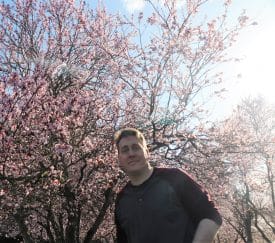















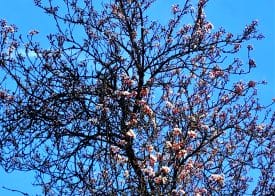

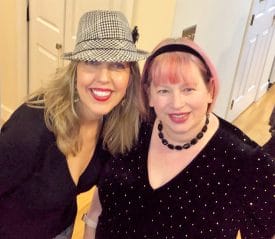
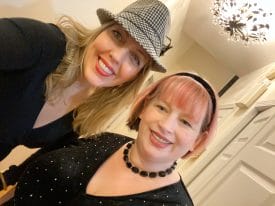

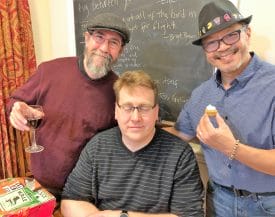

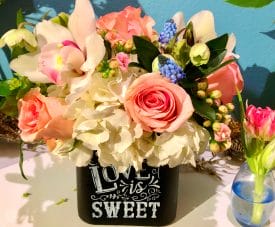









 Jeannine Hall Gailey served as the second Poet Laureate of Redmond, Washington and the author of Becoming the Villainess, She Returns to the Floating World, Unexplained Fevers, The Robot Scientist’s Daughter, and winner of the Moon City Press Book Prize and SFPA’s Elgin Award, Field Guide to the End of the World. Her latest, Flare, Corona from BOA Editions, was a finalist for the Washington State Book Award. She’s also the author of PR for Poets, a Guidebook to Publicity and Marketing. Her work has been featured on NPR’s The Writer’s Almanac, Verse Daily and The Year’s Best Fantasy and Horror. Her poems have appeared in The American Poetry Review, Poetry, and JAMA.
Jeannine Hall Gailey served as the second Poet Laureate of Redmond, Washington and the author of Becoming the Villainess, She Returns to the Floating World, Unexplained Fevers, The Robot Scientist’s Daughter, and winner of the Moon City Press Book Prize and SFPA’s Elgin Award, Field Guide to the End of the World. Her latest, Flare, Corona from BOA Editions, was a finalist for the Washington State Book Award. She’s also the author of PR for Poets, a Guidebook to Publicity and Marketing. Her work has been featured on NPR’s The Writer’s Almanac, Verse Daily and The Year’s Best Fantasy and Horror. Her poems have appeared in The American Poetry Review, Poetry, and JAMA.






